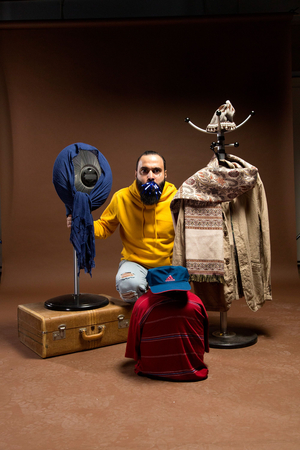Review: SUITCASE / ADRENALINE at Theatre Passe Muraille

Theatre Passe Muraille kicks off 2020 with an Arabic-language double-bill. Is it novelty or innovation? A bit of both, I think.
In the first piece, SUITCASE, a husband (Ahmad Meree, who also wrote both shows) and wife (Nada Abusaleh) are waiting. We're not entirely sure what they're waiting for, but as the scene moves on, we get a picture: they are refugees, probably from Syria, and they've arrived somewhere, probably Canada, hoping to claim status. They are waiting for the news or interview or action that will decide where they spend the rest of their lives.
They've arrived with nothing, it seems, but the clothes on their backs and a single suitcase. That's why they're so nervous, why their jokes are nervous, their singing is nervous. They are vulnerable, scared, and, moreover, traumatized - in this new environment, Razan and Samer take the bold step of revealing to each other for the first time the torture that they suffered at the hands of ISIS.
The descriptions are graphic; it would be unkind to rewrite them here. But Razan and Samer's pain seems overshadowed by something else - a feeling neither they nor we can put a finger on. And, to top it off, Razan's just remembered she left something important in their old home. Something she didn't get into their suitcase on time. A painting? A vase?
A smell?
A family?
In its last few moments, the nervous, comic energy of SUITCASE gives way to a wave of sentimental longing. It is a longing Razan and Samer have been feeling this whole time, a longing that thousands of Canadians feel: for a place you cannot go back to, for a life that no longer exists.
In the much shorter ADRENALINE, a young man (Meree) sits at home, alone, on New Year's Eve. In the comfort of his apartment, separated by four walls from all prying eyes, he strikes up a conversation with a floor fan, serves pizza to a propane tank. They are his family, or that's what he calls them; his real family died in an attack in their home country. The conversation continues until the man, overcome with grief and frustration, tears the fantasy apart in a desperate act of self-flagellation.
Just as he lacks a name, I found that the young man in ADRENALINE was incomplete psychologically. The way he transitions between delusion and reality, giddiness and grief, seems too convenient, too theatrical. He reminded me of the way Tennessee Williams wrote insanity, all polkas and flashbacks. Audiences today ought to expect playwrights to take a more nuanced approach to mental health issues.
SUITCASE, on the other hand, hits all the right notes. It is a bit funny, a bit sexy, a bit scary, and beautiful in the end. Fans of Samuel Beckett, Neil Simon, and the International page of the Globe and Mail will recognise what Meree is building before it is complete, then marvel at its finished state.
Listening to actors speak Arabic was a new experience for me, and one that took some getting used to. The surtitles are displayed some fifteen feet up in the air, and I felt a bit like a bobble-head looking up at the text then down at the actors then up again. Meree and Abusaleh are both fine, authentic actors, but I spent so much time looking away from them that I didn't have the chance to fully enjoy their excellent craft.
SUITCASE/ADRENALINE runs through 1 February at Theatre Passe Muraille, 16 Ryerson Avenue, Toronto.
For more information or to buy tickets, click here.
Photo credit: Peter Riddihough
Reader Reviews

Videos

